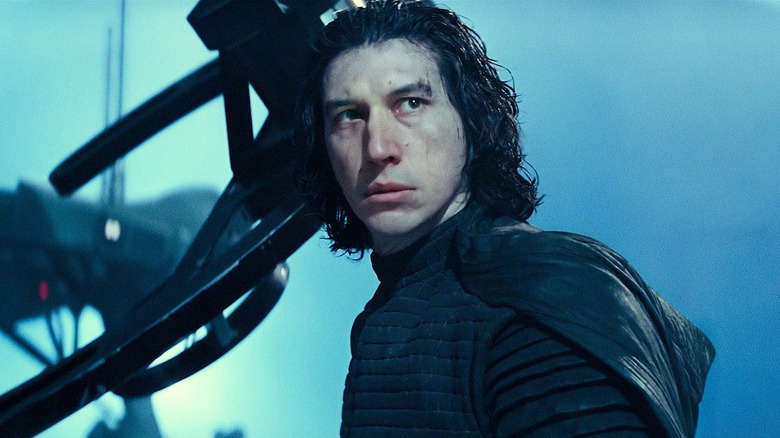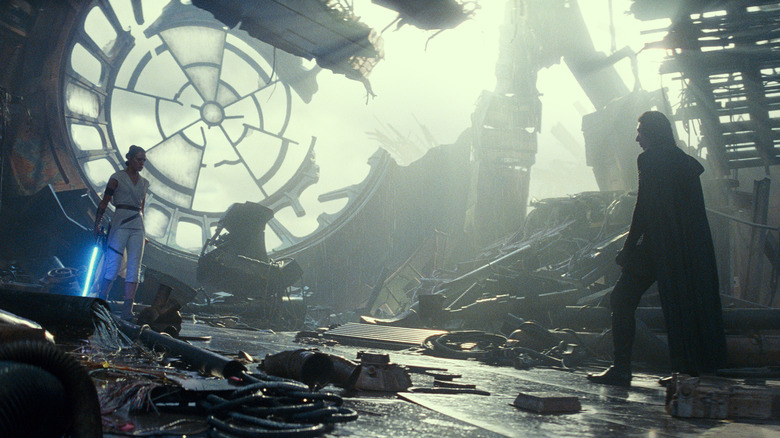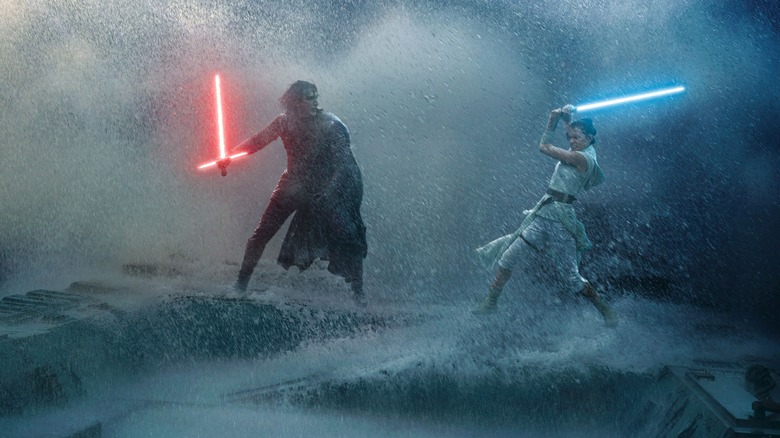Kylo Ren's Biggest Star Wars Moment Was Not Part Of The Original Plan
Oh, the untapped potential of Kylo Ren. "The Force Awakens" set up Adam Driver's new masked menace as the main antagonist of the trilogy after murdering his father, Han Solo, in cold blood. In "The Last Jedi," he flirted with redemption during that epic throne room battle before rejecting the Light altogether and taking his place as the new Supreme Chancellor of the First Order. In "The Rise of Skywalker," he frustratingly takes second billing once again to a bigger threat, this time Palpatine (you know the drill) — until he hallucinates an entire conversation with his dead dad, flips a switch back to the side of the good guys at the last minute, and shares a weirdly rushed kiss with Rey (Daisy Ridley) before dying unceremoniously. Very few liked this abrupt turn of events and fans have wondered what went wrong ever since.
Until now, that is. In an appearance on The Rich Eisen Show (via Collider), Driver finally opened up about Kylo Ren's initial arc and how things didn't quite unfold according to plan. He reveals that, when the actor first signed onto the trilogy, he was sold on a pitch likening the new villain to Darth Vader — or, rather, the inverse of the classic "Star Wars" figure. As he explained:
"I had an overall arc in mind that he [likely referring to J.J. Abrams] wanted to do, which then changed. His idea was almost the opposite journey of Vader, where Vader starts the most confident, the most committed to the Dark Side, and by the last movie he's the most vulnerable and weak. And he wanted to start at the opposite, where this character was the most confused and vulnerable and by the end of the three movies, would be most committed to the Dark Side."
'A different direction'
Apologies to "Bendemption" and "Reylo" enthusiasts, but the first two movies of the sequel trilogy take a pretty straightforward approach to establishing the villainy of Kylo Ren and setting him up as the ultimate big bad of the trilogy — and Adam Driver himself agrees. In fact, having the character formerly known as Ben Solo succumb to the Dark Side appears to have been the biggest creative choice from the start. After confirming this in the interview, he goes on to say that he made specific acting choices based on that characterization:
"I tried to keep that arc in mind, regardless if that wound up not being the journey anyway. Because it changed, obviously, while we were shooting."
That's putting it mildly! But as we all know, to paraphrase a popular saying, writers make plans and the film gods laugh. After "The Last Jedi" ends with Kylo Ren's attempted murder of his uncle Luke Skywalker and Rey literally closing a door on him through their Force connection — this franchise has never been subtle, folks — "Jurassic World" director Colin Trevorrow had intended to pick up on this hanging thread and, according to the script leaks, make Kylo Ren the main villain of "Duel of the Fates." That obviously didn't happen and, after Trevorrow was fired, Abrams was brought back on board. Presumably this would've allowed him to follow through on his own original intentions for the villain, but that wasn't the case, either.
So when did this change happen? After a bit of a pregnant pause, Driver recalls:
"Well, with ['The Last Jedi' director Rian Johnson], he took it into a different direction, but it still tracked with the character. Then the last one, it changed into being about [Kylo Ren and Rey] and the Dyad."
Sifting through the wreckage
I can already imagine all the angry fans rushing to lay the blame at the feet of Rian Johnson and "The Last Jedi" for Kylo Ren's underwhelming fate, but that would be misguided. Even Adam Driver acknowledges that, though perhaps not what Abrams may have envisioned, Johnson made bold creative choices that remain in line with the character. It was only "The Rise of Skywalker" that made a hard swerve and, in my opinion, went against so much obvious setup and undid all the potential that once felt so apparent. To be blunt, there are a few main reasons why the threequel falls apart: the numerous rewrites that writer Chris Terrio publicly acknowledged (at least some of which were necessitated by Carrie Fisher's unfortunate passing), and the film's bizarre obsession with pleasing so many different subsets of fans. The seemingly last-minute push for both Bendemption and the Reylo kiss isn't the biggest problem, but it definitely feels like a symptom of the behind-the-scenes chaos.
From a narrative perspective, all signs pointed towards Kylo Ren's buildup to becoming a darker take on his grandfather Darth Vader, but perhaps Abrams or Lucasfilm or even higher-ups at Disney got cold feet and changed course accordingly. The complete story behind what went down throughout the messy development of "The Rise of Skywalker" still hasn't been told in full and, based on what happened with the tell-all book that would've documented the similarly setback-plagued production of "The Force Awakens," we probably never will. ("The Last Jedi," you'll notice, is the one and only big-screen "Star Wars" project that enjoyed a completely drama-free filmmaking process from scripting to filming to release.)
But even with the sequel trilogy firmly in our rearview mirror, there's still much to discover about what could've been.


